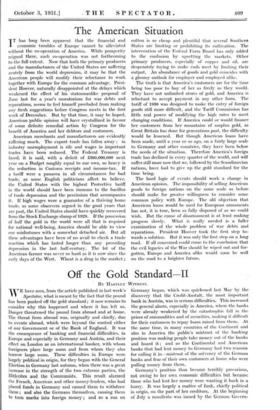The American Situation
IT has long been apparent that the financial and economic troubles of Europe cannot be alleviated without the co-operation of America. While prosperity reigned there, such co-operation was not forthcoming to the full extent. Now that both the primary producers and the manufacturers of the United States are suffering acutely from the world depression, it may be that the American people will modify their reluctance to work together with Europe for the common advantage. Presi- dent Hoover, naturally disappointed at the delays which weakened the effect of his statesmanlike proposal of June last for a year's moratorium for war debts and reparations, seems to feel himself precluded from making any fresh suggestions before Congress meets in the first week of December. But by that time, it may be hoped, American public opinion will have crystallized in favour of some definite remedial action by Congress for the benefit of America and her debtors and customers.
American merchants and manufacturers are evidently suffering much. The export trade has fallen away ; in industry unemployment is rife and wages in important trades have been reduced. The Federal Treasury is faced, it is said, with a deficit of £300,000,000 next year on a Budget roughly equal to our own, so heavy is the reduction in Customs receipts and income-tax. If a tariff were a panacea in all circumstances for bad trade, as some English politicians affect to believe, the United States with the highest Protective tariff in the world should have been immune to the bacillus of trade depression and the pessimism that accompanies it. If high wages were a guarantee of a thriving home trade, as some observers argued in the good years that are past, the United States should have quickly recovered from the Stock Exchange slump of 1929. If the possession of half the gold in the world were all that is required for national well-being, America should be able to view our misfortunes with a somewhat detached air. But all these advantages have been of no avail to check a trade reaction which has lasted longer than any preceding depression in the last half-century. The lot of the American farmer was never so hard as it is now since the early days of the West. Wheat is a drug in the market cotton is so cheap and plentiful that several Southern States are limiting or prohibiting its cultivation. The intervention of the Federal Farm Board has only added to the confusion by upsetting the markets. Other primary producers, especially of copper and oil, are desperately trying to make ends meet by limiting their output. An abundance of goods and gold coincides with a gloomy outlook for employer and employed alike.
The truth is that America's customers are for the time being too poor to buy of her as freely as they would. They have not unlimited stores of gold, and America is reluctant to accept payment in any other form. The tariff of 1930 was designed to make the entry of foreign goods still more difficult, and the Tariff Commission has little real power of modifying the high rates to meet changing conditions. If America could or would finance her customers from her mountains of surplus gold, as Great Britain has done for generations past, the difficulty would be lessened. But though American loans have been made, until a year or so ago, on a fairly large scale to Germany and other countries, they have been below the needs of the situation. Therefore America's foreign trade has declined in every quarter of the world, and will suffer still more now that we, followed by the Scandinavian nations, have had to give up the gold standard for the time being.
The hard logic of events should work a change in American opinion. The impossibility of selling American goods to foreign nations on the same scale as before should make for greater willingness to consider some common policy with Europe. The old objection that American loans would be used for European armaments has not, it is true, been so fully disposed of as we could wish. But the cause of disarmament is at least making progress slowly. What is really needed is a fuller examination of the whole problem of war debts and reparations. President Hoover took the first step to- wards a solution. But it was only the first step on a long road. If all concerned could come to the conclusion that the evil legacies of the War should be wiped out and for- gotten, Europe and America alike would soon be well on the road to a brighter future.










































 Previous page
Previous page